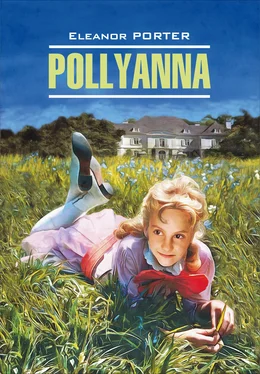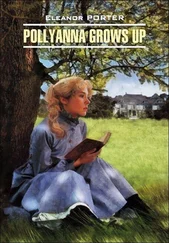“Eh? Well, I don’t know, I don’t know,” moaned Nancy, with a shake of her head as she turned away. “Seems as if I jest couldn’t stand it till that doctor gits out o’ there. I wish I had a washin’ ter do – the biggest washin’ I ever see, I do, I do!” she wailed, wringing her hands helplessly.
Even after the doctor was gone, however, there seemed to be little that Nancy could tell Mr. Tom. There appeared to be no bones broken, and the cut was of slight consequence; but the doctor had looked very grave, had shaken his head slowly, and had said that time alone could tell [160] time alone could tell – ( разг. ) время покажет
. After he had gone, Miss Polly had shown a face even whiter and more drawn-looking than before. The patient had not fully recovered consciousness, but at present she seemed to be resting as comfortably as could be expected. A trained nurse had been sent for, and would come that night. That was all. And Nancy turned sobbingly, and went back to her kitchen.
It was sometime during the next forenoon that Pollyanna opened conscious eyes and realized where she was.
“Why, Aunt Polly, what’s the matter? Isn’t it daytime? Why don’t I get up?” she cried. “Why, Aunt Polly, I can’t get up,” she moaned, falling back on the pillow, after an ineffectual attempt to lift herself.
“No, dear, I wouldn’t try – just yet,” soothed her aunt quickly, but very quietly.
“But what is the matter? Why can’t I get up?”
Miss Polly’s eyes asked an agonized question of the white-capped young woman standing in the window, out of the range of Pollyanna’s eyes.
The young woman nodded.
“Tell her,” the lips said.
Miss Polly cleared her throat, and tried to swallow the lump that would scarcely let her speak.
“You were hurt, dear, by the automobile last night. But never mind that now. Auntie wants you to rest and go to sleep again.”
“Hurt? Oh, yes; I – I ran.” Pollyanna’s eyes were dazed. She lifted her hand to her forehead. “Why, it’s – done up, and it – hurts!”
“Yes, dear; but never mind. Just – just rest.”
“But, Aunt Polly, I feel so funny, and so bad! My legs feel so – so queer – only they don’t FEEL – at all!”
With an imploring look into the nurse’s face, Miss Polly struggled to her feet, and turned away. The nurse came forward quickly.
“Suppose you let me talk to you now,” she began cheerily. “I’m sure I think it’s high time [161] it’s high time – ( разг. ) давно пора
we were getting acquainted, and I’m going to introduce myself. I am Miss Hunt, and I’ve come to help your aunt take care of you. And the very first thing I’m going to do is to ask you to swallow these little white pills for me.”
Pollyanna’s eyes grew a bit wild.
“But I don’t want to be taken care of – that is, not for long! I want to get up. You know I go to school. Can’t I go to school to-morrow?”
From the window where Aunt Polly stood now there came a half-stifled cry.
“To-morrow?” smiled the nurse, brightly. “Well, I may not let you out quite so soon as that, Miss Pollyanna. But just swallow these little pills for me, please, and we’ll see what THEY’lL do.”
“All right,” agreed Pollyanna, somewhat doubtfully; “but I MUST go to school day after to-morrow – there are examinations then, you know.”
She spoke again, a minute later. She spoke of school, and of the automobile, and of how her head ached; but very soon her voice trailed into silence under the blessed influence of the little white pills she had swallowed.
Chapter XXIV
John Pendleton
Pollyanna did not go to school “to-morrow,” nor the “day after to-morrow.” Pollyanna, however, did not realize this, except momentarily when a brief period of full consciousness sent insistent questions to her lips. Pollyanna did not realize anything, in fact, very clearly until a week had passed; then the fever subsided, the pain lessened somewhat, and her mind awoke to full consciousness. She had then to be told all over again what had occurred.
“And so it’s hurt that I am, and not sick,” she sighed at last. “Well, I’m glad of that.”
“G-glad, Pollyanna?” asked her aunt, who was sitting by the bed.
“Yes. I’d so much rather have broken legs like Mr. Pendleton’s than lifelong-invalids like Mrs. Snow, you know. Broken legs get well, and lifelong-invalids don’t.”
Miss Polly – who had said nothing whatever about broken legs – got suddenly to her feet and walked to the little dressing table across the room. She was picking up one object after another now, and putting each down, in an aimless fashion quite unlike her usual decisiveness. Her face was not aimless-looking at all, however; it was white and drawn.
On the bed Pollyanna lay blinking at the dancing band of colors on the ceiling, which came from one of the prisms in the window.
“I’m glad it isn’t smallpox that ails me, too,” she murmured contentedly. “That would be worse than freckles. And I’m glad ’tisn’t whooping cough – I’ve had that, and it’s horrid – and I’m glad ’tisn’t appendicitis nor measles, ’cause they’re catching – measles are, I mean – and they wouldn’t let you stay here.”
“You seem to – to be glad for a good many things, my dear,” faltered Aunt Polly, putting her hand to her throat as if her collar bound.
Pollyanna laughed softly.
“I am. I’ve been thinking of ’em – lots of ’em – all the time I’ve been looking up at that rainbow. I love rainbows. I’m so glad Mr. Pendleton gave me those prisms! I’m glad of some things I haven’t said yet. I don’t know but I’m ’most glad I was hurt.”
“Pollyanna!”
Pollyanna laughed softly again. She turned luminous eyes on her aunt. “Well, you see, since I have been hurt, you’ve called me ‘dear’ lots of times – and you didn’t before. I love to be called ‘dear’ – by folks that belong to you, I mean. Some of the Ladies’ Aiders did call me that; and of course that was pretty nice, but not so nice as if they had belonged to me, like you do. Oh, Aunt Polly, I’m so glad you belong to me!”
Aunt Polly did not answer. Her hand was at her throat again. Her eyes were full of tears. She had turned away and was hurrying from the room through the door by which the nurse had just entered.
It was that afternoon that Nancy ran out to Old Tom, who was cleaning harnesses in the barn. Her eyes were wild.
“Mr. Tom, Mr. Tom, guess what’s happened,” she panted. “You couldn’t guess in a thousand years – you couldn’t, you couldn’t!”
“Then I cal’late I won’t try [162] I cal’late I won’t try – ( искаж. ) думаю, я и пытаться не буду
,” retorted the man, grimly, “specially as I hain’t got more’n TEN ter live, anyhow, probably. You’d better tell me first off, Nancy.”
“Well, listen, then. Who do you s’pose is in the parlor now with the mistress? Who, I say?”
Old Tom shook his head.
“There’s no tellin’,” he declared.
“Yes, there is. I’m tellin’. It’s – John Pendleton!”
“Sho, now! You’re jokin’, girl.”
“Not much I am – an’ me a-lettin’ him in myself – crutches an’ all! An’ the team he come in a-waitin’ this minute at the door for him, jest as if he wa’n’t the cranky old crosspatch he is, what never talks ter no one! jest think, Mr. Tom – HIM a-callin’ on HER!”
“Well, why not?” demanded the old man, a little aggressively.
Nancy gave him a scornful glance.
“As if you didn’t know better’n me!” she derided.
Читать дальше
Конец ознакомительного отрывка
Купить книгу












